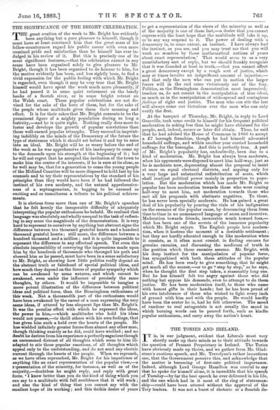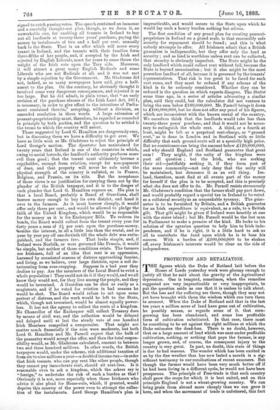nib TORIES AND IRELAND.
IT is, in our judgment, evident that Liberals must very shortly make up their minds as to their attitude towards the question of Peasant Proprietary in Ireland. The Tories have obviously made up theirs, and we gather from Mr. Glad- stone's cautious speech, and Mr. Trevelyan's rather incautious one, that the Government perceive this, and acknowledge that the matter is becoming of first-rate political importance. Indeed, although Lord George Hamilton was careful to say that he spoke for himself alone, it is incredible that his speech of Tuesday—by far the best speech he ever delivered in his life, and the one which had in it most of the ring of statesman- ship—could have been uttered without the approval of the Tory leaders. It was not a burst of rhetoric or a flourish de-
signed to catch passing votes. The speech contained an immense and a carefully thought-out plan, though, as we deem it, an unworkable one, for enabling all tenants in Ireland to buy out all landlords at twenty-three years' purchase, paying the money by instalments of two and a half per cent. annually back to the State. That is an offer which will move every tenant in Ireland, and the tenants with their families form three-fifths of her people, and, if accepted by the Irish and rejected by English Liberals, must for years to come throw the weight of the Irish vote upon the Tory side. Moreover, it will attract a great many English Radicals and some Liberals who are not Radicals at all, and it was not met by a simple rejection by the Government. Mr. Gladstone did not, indeed, as so many newspapers have said, give a half- assent to the plan. On the contrary, he obviously thought it involved some very dangerous consequences, and rejected it as too large. But he did admit, in plain term=, that " an early revision of the purchase clauses of the Irish Land Act, 1871, is necessary, in order to give effect to the intentions of Parlia- ment contained therein," accepting, without a division, an .amended resolution in those words. A large extension of peasant-proprietorship must, therefore, be regarded as conceded in principle by both parties, and the question to be settled is the terms to which the country will assent.
Those suggested by Lord G. Hamilton are dangerously easy, but in discussing them we have a difficulty to get over. We have as little wish as Mr. Gladstone to reject the principle of Lord George's motion. The Spectator has maintained for twenty years that Ireland is one of the countries in which, owing to social hatreds, the landlord's authority produces more evil than good; that the tenant must ultimately become a copyholder, exempt from eviction, except for non-payment of dues, and that property will never be safe until the physical strength of the country is enlisted, as in France, Belgium, and Prussia, on its side. But the acceptance of those views is no justification for carrying them out by the plunder of the British taxpayer, and it is to the danger of such plunder that Lord G. Hamilton exposes us. His plan is that a local Board, probably a Board of Guardians, shall borrow money enough to buy its own district, and hand it over to the farmers. As it must borrow cheaply, it would offer only three per cent., and would be allowed to pledge the faith of the United Kingdom, which would be as responsible for the money as it is for Exchequer Bills. To redeem its bonds, the Board would collect from the tenant every year for 'forty years a sum of 22 per cent. upon the purchase-money, hesides the interest, in all a little less than the rental, and so year by year pay off one-fortieth till the whole debt was extin- guished, and the farmers free. That looks simple, and, if Ireland were Norfolk, or were governed like Prussia, it would he simple, but neither of those conditions exists. The farmers are Irishmen, full of an idea that rent is an oppression, harassed by occasional seasons of distress approaching famine, and living, as we believe, over large districts, upon a soil de- teriorating from over-cropping. Suppose in a bad year they decline to pay. Are the members of the Local Board to evict a whole population ? They could not do it if they would, and we all know they would not, for they live among the people, and they would be terrorised. A Guardian can be shot as easily as a magistrate, and if he voted for eviction in bad seasons he would be shot. The Board would refuse to act upon some pretext of distress, and the work would be left to the State, which, though not terrorised, would be almost equally power- less. It has not the agency to collect the rents of a kingdom. No Chancellor of the Exchequer will collect Treasury dues by means of civil war, and the collection would be delayed and delayed until at last the steady vote of one hundred Irish Members compelled a compromise. That might not matter much financially if the sum were moderate, but both Lord G. Hamilton and Mr. Parnell expect that the bulk of the peasantry would accept the offer, and then the total respon- sibility would, as Mr. Gladstone calculated, amount to between two and three hundred millions. In other words, the British taxpayers would, under the scheme, risk additional taxation of from six to nine millions a year—a doubled income-tax—in order that Irish tenants, who can pay rent like other people, though they cannot pay immoderate rent, should sit rent-free. Is it reasonable even to ask a kingdom, which the askers say is " foreign," to undertake the risk of such a burden as that? Obviously it is not, more especially when those Irishmen who advise it also plead for Home-rule, which, if granted, would deprive this country of the power even to attempt the collec- tion of the instalments. Lord George Hamilton's plan is impracticable, and would secure to the State upon which he would lay such a heavy burden nothing but odium.
The first condition of any grand plan for creating peasant- proprietors in Ireland on a grand scale, is that reasonably safe security for repayment should be found ; and this is what nobody attempts to offer. All Irishmen admit that a British
guarantee is indispensable, but they offer only the land as security ; and as land is worthless unless rent can be collected, that security is obviously imperfect. The State might be the only landlord which could collect rent without fail, because the State is beyond assassination ; but it also might be the most powerless landlord of all, because it is governed by the tenants' representatives. That risk is too great to be faced for such vast sums, and they must be reduced if any scheme of the kind is to be seriously considered. Whether they. can be reduced is the question on which experts disagree. The Statist some time ago, in a series of articles advocating a similar plan, said they could, but the calculator did not venture to bring the sum below £180,000,000. Mr. Parnell brings it down to £100,000,000, but he does not offer any proof of his figures, which are inconsistent with the known rental of the country. We ourselves think that the landlords would take less than twenty-three years' purchase, and that it would not be neces- sary to extinguish the whole rent. A third, or a fourth at least, might be left as a perpetual rent-charge, or "ground rent," as is done in London and in Scotland with so little difficulty that such ground-rents sell at a specially high price. But no contrivance can bring the amount below £120,000,000, and why should England and Scotland guarantee that great sum ? They might, if the unity of the kingdom were past all question ; but the Irish, who are seeking their aid—justifiably seeking it, if they form part of the same community—not only deny that the unity will be maintained, but denounce it as an evil thing. Ire- land, therefore, must find at all events part of the money for herself if the plan is to be accepted, and this is precisely what she does not offer to do. Mr. Parnell resists strenuously Mr. Gladstone's condition that the farmer shall pay part down, and would probably regard a special tax in Ireland to be voted as a collateral security as an unspeakable tyranny. The guar- antee is to be furnished by Britain, and a British guarantee for an Irish expenditure is equivalent, as a rule, to a British gift. That gift might be given if Ireland were heartily at one with the sister island ; but Mr. Parnell would be the last man in Parliament to make a promise of the kind. He looks to his solution of the agrarian question to help him to Irish inde- pendence, and if he is right, it is a little hard to ask us all to contribute the fund upon which he is to base his success. With a burden of £200,000,000 to be shaken off, every Irishman's interests would be clear on the side of independence.



































 Previous page
Previous page